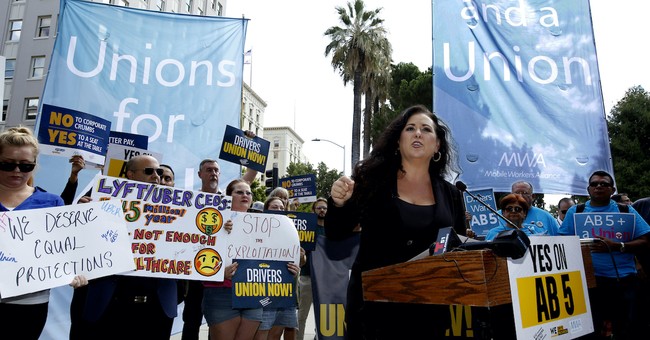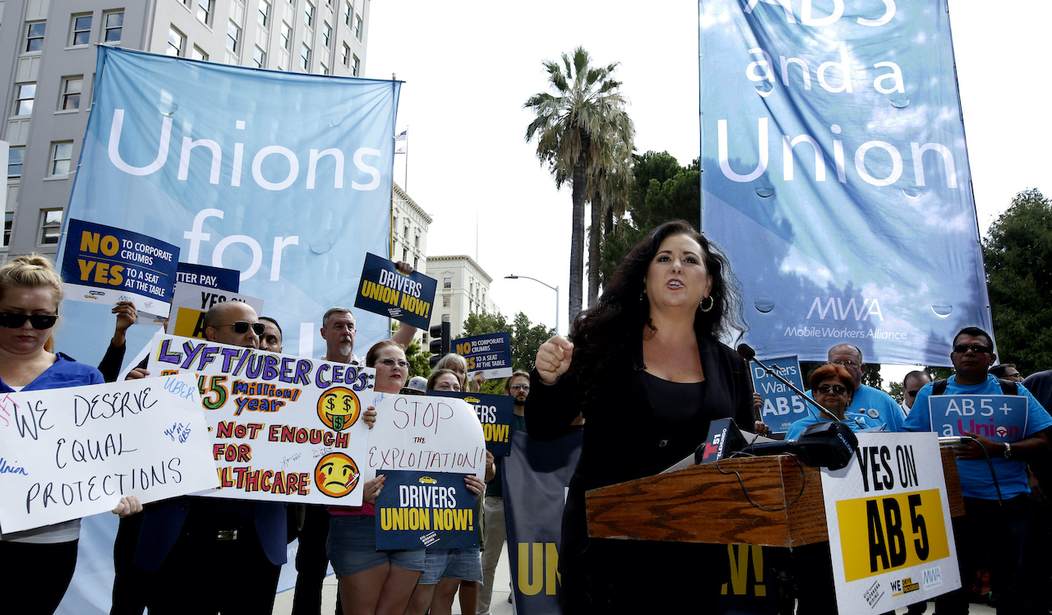
Thanks for nothing, California’s greedy union-backed politicians. You got what you wanted – Uber and Lyft are forced to comply with AB5, effective August 20 – but what you forgot is that you can’t compel a business to remain in the state if your laws have made it impossible for them to merely break even. Now it looks like the rideshare companies will leave the state, in the middle of a pandemic.
Way to go.
California’s anti-freelancing law, AB5, was aimed primarily at forcing companies like Uber and Lyft to classify their drivers as employees and guarantee “minimum wage” and employee benefits at the expense of flexibility and autonomy. When the law went into effect on January 1, 2020, Uber and Lyft’s business models continued essentially without a hitch while hundreds of thousands of other professionals who’d worked as independent contractors – speech therapists, translators, respiratory therapists, writers, photographers, bartenders, musicians, and many more – were immediately negatively impacted, some losing their incomes entirely.
Uber, Lyft, and other app-based companies worked to qualify a ballot initiative, Proposition 22, for the November ballot that would repeal AB5, at least as it applied to app-based companies, while AB5 author Asm. Lorena Gonzalez-Fletcher (D-Chula Vista) and her buddy, UC Berkeley law professor Veena Dubal, stewed. In May city attorneys from San Francisco, Los Angeles, and San Diego, along with Attorney General Xavier Becerra, filed suit against Uber and Lyft, accusing them of violating “the new state law known as AB5.”
A hearing on the Attorney General’s Motion for a Preliminary Injunction was held before Judge Ethan Schulman of the San Francisco County Superior Court, who ruled Monday granting the injunction and ordering Uber and Lyft to comply with AB5 and treat their drivers as employees. Schulman stayed enforcement of the order for 10 days pending appeal.
On Wednesday Uber CEO Dara Khosrowshahi appeared on MSNBC and said the company asked Judge Schulman to stay the order beyond 10 days and through the entire appeal process, and that Uber would likely shut down service in California for “likely more than a year” if that request was denied.
If the court doesn’t reconsider, then in California it’s hard to believe that we’ll be able to switch our model to full-time employment quickly so I think Uber will shut down for a while.
And really I think the big question is, in November with Prop 22 – we have a proposition out there that puts forward what we believe is the best of both world, which is our drivers, the vast majority of which, a 4:1 ratio want flexibility and don’t want to be full-time workers, where drivers can continue to have the flexibility that they have but they can enjoy the protections, benefit fund, an earnings standard, so that they’ve got the protections that many associate with full-time work.
Then we’re gonna have to work to move to a full-time model. It’s essentially how Uber started, which was kind of a black car service with very few cars on the road and much higher prices. So we will look to flip to a full-time model, but this is a model that we built over 10 years. We can’t go out and hire tens of thousands of people directly overnight. So it would take a significant amount of time to switch over.
We would look to get back on the road as quickly as possible. You would just get a much smaller service, much higher prices, and probably a service that’s focused in the center of cities versus a bunch of the smaller cities or the suburbs that we operate in right now.
That’s the reality. So it’s not a game of chicken one way or the other. It’s really up to the courts, and we’re gonna comply with the law.
Lyft CEO John Zimmer also said Wednesday that his company would also suspend operations in California if the stay wasn’t issued.
Thursday morning Judge Schulman denied the motion, as Financial Times’ Dave Lee tweeted:
Judge in Uber/Lyft sets the countdown to the services likely shutting down across the state: "I am unconvinced that any extension of the 10 day stay is required. Both applications are denied."
— Dave Lee (@DaveLeeFT) August 13, 2020
Union-backed but allegedly grassroots group Gig Workers Rising could hardly contain their glee:
Wait, what?
Did the Judge just hang up on the Uber & Lyft lawyers after denying their request to break the law for longer?!
The Judge is literally all of us right now. https://t.co/KeMdeMAgRY
— Gig Workers Rising (@GigWorkersRise) August 13, 2020
AB5 proponents say Uber & Lyft are playing a game of chicken and won’t really pull out of the state, but they’ve pulled out of markets before – they pulled out of Austin, TX for seven months. And, since San Francisco’s City Attorney filed a Motion for Preliminary Injunction Wednesday in their pending suit against Doordash, no doubt emboldened by the positive ruling in the Uber/Lyft case, it looks like meal delivery apps could be the next on the chopping block.
Nothing says “looking out for the small guy” or “looking out for the public” like taking action to annihilate tens of thousands of gigs in a period of historic unemployment and doing away with safe meal delivery options during a pandemic. Enjoy that backlash in November, California Dems.














Join the conversation as a VIP Member